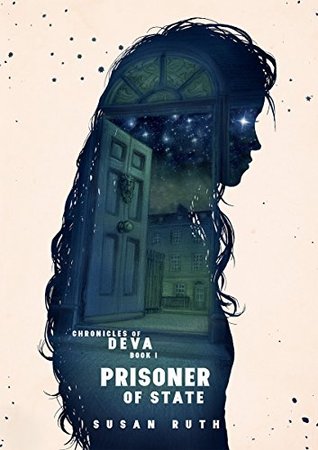
Susan Ruth is (or was; I can't find her anymore!) a member of the 20,000-member NaNoWriMo group on Facebook, of which I am also a member. I'm not a very active one, but a good deal of their stuff shows up on my feed, and when Ruth was getting ready to put out Prisoner of State, she posted a few different versions of the cover for the group to see. That was it: I was hooked. I have a thing for silhouette covers, especially ones as gorgeous as this, and when Prisoner of State dropped, I scurried off to buy it. It then sat unread on my Kindle for months because it was buried in the midst of 600 other ebooks. But I finally dug it up and read it, and let me say this...it was an experience that left me unsure of how I feel about the book as a whole.
This isn't a short book. It's also not an extraordinarily long one, but it's 400 or so pages of dense content, and a convoluted plot that left me feeling like I needed charts in order to follow it. Felix Skryker, the main character, makes a variety of notes and charts and family trees in his attempts to unravel the mysteries surrounding Prisoner of State Xanthe Chance, who comes into his care in a whirl of strangeness that permeates the entire novel. He uses charts to solve the mystery...but I feel like I shouldn't have to use them to just keep track of what's going on. Part of this is that the threads are all so tangled together, which makes for a realistic mess, but which also makes following the story hard. It's intensely convoluted, with a ton of names to keep track of. Some characters (most characters) also go by multiple names and titles, and everyone is also related somehow, which makes it an even bigger mire of trying to figure out who is who and who did what. But when it came to the characters actually solving the mystery, about 70% of the way through the book, Xanthe decides she's been quite long enough and talks--and then the bulk of the intrigue is done, names and actions and consequences all dumped in your lap over the course of a few pages.
This sudden unraveling has the result of leaving the last 30% of the book feeling rather disconnected. There's a sudden time-jump of about 5 years, which seems to have been manufactured for the singular purpose of shoving in a pseudo-romance that never really gets off the ground. One little bit of the mystery is left to be solved here, but it really isn't, with the mystery just vanishing to live (or die?) another day. This chunk honestly felt like a different book, or like it was fanfiction of the rest of the book. It seemed to float almost entirely apart from the bulk of the narrative, and that...didn't agree with me.
Now, since I've been negative long enough, let's talk about what I loved about this, because there were definitely aspects I loved. First, the atmosphere. Prisoner of State takes place on an alternate Earth which reminded me, more than anything else, of Philip Pullman's The Golden Compass. There aren't daemons attached to people, but there are flying machines and automata and masters of colleges sneaking around with their own political machinations that muddle everything up for everyone else and religion still factoring heavily in to the point that people can still be accused of heresy even though it seems like the late nineteenth or early twentieth century. Xanthe also reminded me, in some ways, of The Golden Compass' heroine, Lyra. Xanthe and Lyra are about the same age and are both thrown into strange situations, though Xanthe has a tragic past and is messed up in ways that Lyra would probably find hard to fathom. There are also strange occurrences that aren't quite magic going on--the Dislocation Barrier comes to mind. The barrier cuts Deva and Mercia (part of what we would call the UK) off from the rest of the world, having arrived abruptly at the end of a civil war. It has turned Deva into a cut-off, dark place, with menaces lurking around every corner. It's hinted at that the bad actions of Deva's inhabitants even fuel the barrier, in a sort of self-perpetuating cycle because there are a lot of bad actions--it's a very dark book. It's a tantalizing look at Ruth's world, which is definitely steampunk-inspired but isn't blatantly so, and I wish we'd gotten a few more lush details like that and perhaps a little bit less of the convolutions that made up most of the plot.
I also really did like the writing itself. Ruth is a very matter-of-fact story teller. She sometimes falls into the school of telling rather than showing, which we're all warned against these days, but in this particular narrative, I think it works. It gives it a slightly dated feel, which makes it feel like the book was actually written in the time period in which it takes place. She also uses this to build up the mystery and then tear it down quickly, which are less skillful, but the style still worked for me as a whole. It also makes some of the strangeness feel like it belongs, much like Neil Gaiman writes strange things so matter-of-factly that it seems like of course they must be true.
Ruth has some real skill as a writer and storyteller, and I loved her main characters and her world. I do hope she continues to write these Chronicles of Deva, though I would like to see a little more streamlining as she matures as an author, so that the narrative doesn't leave me with a headache when I step away from trying to keep everything straight.
3.5 stars out 5.
No comments:
Post a Comment